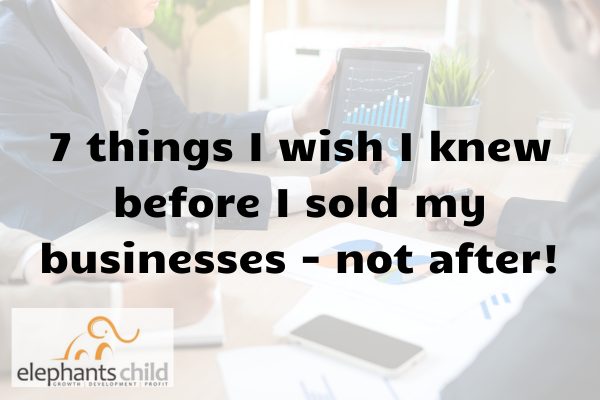7 things I wish I knew before I sold my businesses – not after!
Having built and sold three businesses, Steve Bird, one of our Business Growth Advisors, has learned a thing or seven:
The major overarching lesson is that you need professional help, and that help creates value in the transaction. You need to trust that your chosen professional help can save you money, like a good lawyer protecting your personal warranties, or growth advisor who can make you money by helping you set a price that exceeds your expectations.
1. Money isn’t everything
Buyers don’t just have financial goals, you need to dig into each buyer’s goals and understand how they can help you achieve your companies’ goals. How those goals fit with your strategy as a seller and for the business. I would suggest that you need to understand what you want for the business in the future, perhaps I should describe it as your legacy. I parted company with my last start-up business in 2010 and in 2022 I met up with the CEO who had recently acquired that business as part of a wider deal. He told me he’d found a “gem”. I was so proud and proved that legacies last a while.
But if the gut tells you its not the right fit, then its not the right fit. Close the deal down quickly.
2. Don’t forget the management team
To get the best value for your business, you need a strong management team and each of your team members have their own goals. Make sure you include them in your thinking, they will reward you. The success of a deal hinges on numerous factors, but the importance of a strong management team cannot be overstated. A skilled and united management team brings invaluable expertise, leadership, and vision to effectively navigate challenges and capitalise on future opportunities. Without them you haven’t got a business.
3. Time kills the deal
There are a range of advisors on both sides and usually a number of decision makers, so the deal needs momentum to drive through each step. Without momentum any change of circumstances in the price algorithm, or the detail in due diligence (DD), or a legal clause in the Sale and Purchase Agreement (SPA) will cause delay and allow the other side to move onto another priority. Don’t give them that opportunity, I have always used an individual who is the first point of contact and will understand the question and direct it to the appropriate person to answer….and hound them until they do answer it. Deal momentum is critical.
4. Get your ducks in a row
Start your DD early, don’t rush it. DD is a comprehensive and systematic process of investigation, analysis, and evaluation of a business. It helps the buyer identify any potential risks or liabilities to help them mitigate any bad outcomes. A bit like a surveyor’s report on a house sale, if it shows up something expensive early, they will keep digging. So, get the DD done early and then you have time to correct the problems you have identified. Fix the damp in the bathroom early and they might not worry about a few lost tiles on the roof.
5. Leaving a little something in the buyer’s pocket
You need to define the growth path of the business and explain why the future is bright. The process of creating your plan is what’s important. Writing your plan and reviewing it regularly gives you a better window into what you need to do to achieve your goals and succeed. Companies with a plan grow faster too, a study by Burke, A., Fraser, S., & Greene, F. J. (2010). The multiple effects of business planning on new venture performance. Journal of Management Studies, 47(3), 391-415 showed that a business with a plan grew 30% more than those without a plan.
6. Understanding your valuation qualitatively
Valuing a business is as much an art as a science. You need to start with an algorithm that has logic – X times EBIT or Y times turnover. But the true value of the business lies in the buyer’s motives for the acquisition, to use my house buying analogy, the fact that your house is in the same road as the best school in the area will allow you to set a premium price, when the kids walk through the door, you know the motivation. But having a quantative method of valuation allows you to manage the buyers desire to reduce the agreed price through the DD process.
7. Avoid the What ifs
It is highly likely that you have never sold a business before as only 1% of businesses created, get sold at all. If you want to be part of the 1% club, you need people who have done it before around you and stop you making daft mistakes early. I signed a term sheet, which is the document that defines the buyers offer, which constrained my lawyer’s ability to negotiate the SPA later in the deal. I employed my lawyer too late, I signed the term sheet without understanding the implications and it cost me. Get a professional team onside – early.
Find out more about Steve Bird and get in touch with him if you need advice on exiting your business. As well as building and selling three of his own businesses he has also invested in and successfully exited another two.
